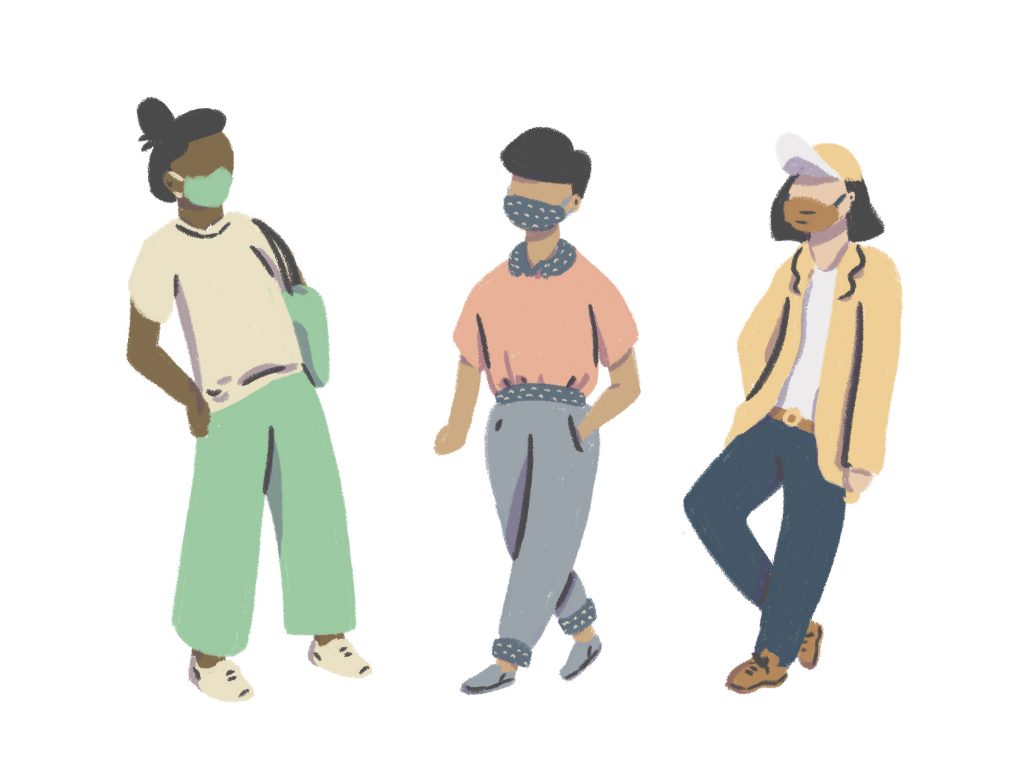“My favorite mask designs are floral printed ones and ones that are double-sided,” Palo Alto High School sophomore Scarlett Cummings says. “I also think that lace detailing makes them look dainty and cute. Animal print is also very unique, and matching the designs on your mask to an outfit is such a great way to spice it up.”
Face masks have become an essential piece of protective equipment for venturing outside our homes and into public spaces. When combined with regular hand washing and social distancing practices, mask-wearing is cited as one of the most effective ways to halt the spread of COVID-19 the global demand for protective equipment has not slowed down, and many are finding new ways to get creative with their face masks. As face masks quickly become the most universally worn accessory, the fashion industry has responded with thousands of different stylizations and designs.
Evolving through the ages
For centuries, significant historical events have helped to shape fashion trends. Denim and jeans were initially created for miners during the 19th century due to their durability and strength, in order to withstand the rough conditions during the Gold Rush. They later exploded in popularity, and have continued to serve as a wardrobe staple for millions all over the world.
Even the Spanish Flu epidemic of 1918 introduced trends with the purpose of stopping viral spread. Sales of “flu veils,” a thick chiffon veil secured on a large hat and covering the subject’s face, skyrocketed at the time. These earlier forms of protective wear became fashionable, a trend which draws several clear parallels to today’s increased use of face masks in wake of the COVID-19 pandemic.
Mask madness
As many nations continue to uphold a mask mandate, masks are now an everyday essential open to the artistic interpretations of the fashion industry and an array of designers.
Almost every high profile designer and label, including Fendi, Off-White and VPL, has released their own line of luxury masks. During the virtual New York Fashion Week in September, face masks were the most ubiquitous accessory, worn by almost every model as a finishing accessory to complete the outfit.
For junior Jasmine Kapadia, Christian Siriano’s Spring 2021 was especially refreshing and new with the incorporation of masks in the runway looks.
“Having the masks showed that a mask doesn’t have to ruin your outfit at all, it can actually highlight certain prints or details,” Kapadia says. “It kind of elevated the way we think of masks as not just something annoyingly required, but as a statement that you could add to your closet.”
Many students now even have their own favorite brands of masks which they use to protect themselves and add an extra element to their outfit.
“Whether it’s on a walk with my dog or downtown getting lunch, I always keep mine [mask] on,” Cummings says. “I have definitely incorporated masks into my everyday life. My favorite masks are from Kitch, Johnny Waz and handmade ones from Depop.”
Even as COVID-19 numbers quell as vaccines are administered, face masks have a high chance of becoming part of the new normal. Face masks have been a fashion statement for years even before the pandemic in countries such as Japan, China and South Korea.
“I definitely think they’re [masks] here to stay,” Kapadia says. “Asian fashion enthusiasts were already marketing masks as street style accessories before Covid, so it seems natural that the Western market will incorporate them as well.”






